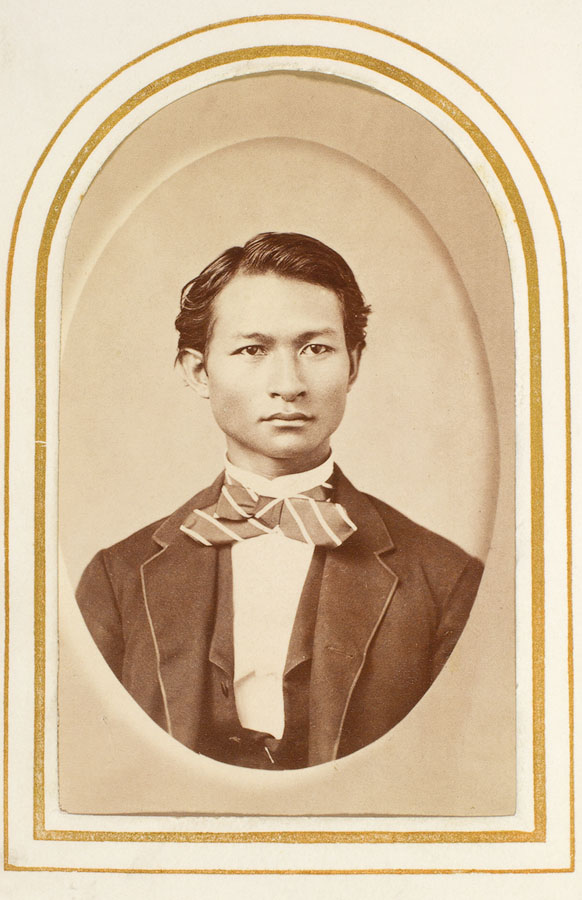Alumni Gazette
 MISSION OF BURMA: Thanbyah, the University’s first graduate from Asia, was recruited by Baptist missionaries. (Photo: University Libraries/Department of Rare Books, Special Collections, and Preservation)
MISSION OF BURMA: Thanbyah, the University’s first graduate from Asia, was recruited by Baptist missionaries. (Photo: University Libraries/Department of Rare Books, Special Collections, and Preservation)On June 28, 1871, Theodore Thanbyah—believed to be the first student from Asia to receive a Rochester degree—stood at the podium and delivered his senior oration at University commencement. The title of his oration was “The Contest for Commercial Supremacy in Asia.”
Thanbyah was born in Bassein, Burma, located west of Rangoon on the delta of the great Irrawaddy River, in September 1843. At that time, there was an active Baptist mission in Bassein working among the Karen people, an ethnic minority group from the higher elevations, in eastern Burma, toward Laos. The Burmese looked down upon the Karens and they suffered some persecution.
Among the more prominent of the first missionaries to work with the Karens was E. L. Abbott, the father of Willard Abbott, Class of 1858. We know from this relationship that there was a link between the Bassein mission and the University.
It is likely that the Baptists recognized Thanbyah’s great potential as a scholar and possible clergyman, as he was sent to the United States for further education. He prepared for college in a special department in connection with Shurtleff College, a Baptist institution in Upper Alton, Ill.
Thanbyah entered the University in September 1868, at the age of 26, along with 14-year-old Henry Hooker Van Meter, Class of 1872, a son of Baptist missionaries in Bassein. Thanbyah and Van Meter may have been sent out from Bassein together and prepared together. We know they entered the University together.
Thanbyah entered the University as a sophomore and followed the classical course of Greek and Latin. After graduating in the Class of 1871, Thanbyah attended the Rochester Theological Seminary, graduating in 1874, at which time he also received an AM degree (a rough equivalent to today’s master of arts degree) from the University. In August of that year, he departed for Burma.
Thanbyah had a long and vigorous career back in his home country. From 1874 until his death in 1920, his address remained Karen Quarter, Kemendine, Rangoon. Among the posts he held were pastor, Rangoon (1875–81); municipal commissioner (1885); teacher, American Baptist Mission (1875–96); Rangoon Karen Home Mission Society (1891–1920); and president, National Karen Association (1881–1903).
He was also the author of several books including Sermons in Karen; A Karen Arithmetic; A Karen Mensuration of Plane Surfaces with Land Surveying; Karen Customs, Ceremonies and Poetry; The Karens: Their Persecutions and Hardships, 1824-1854; The Karens and Their Progress 1854-1914; and Karen Folk-lore Tales. He even produced an abridged version of Robinson Crusoe in the Karen language.
Thanbyah’s own life story, The Pilgrim, published posthumously in 1925, perhaps would prove the most interesting. Unfortunately, however, it has never been translated into English. In 1926, Thanbyah’s nephew, P. Tamlatoo, presented a copy of the memoir to President Rush Rhees. In acknowledging this gift, Rhees lamented, “I profoundly regret that I am unable to read this biography. Your uncle was held in high regard here, and we shall cherish this memorial.” This copy of The Pilgrim remains on the shelves of the Rush Rhees Library in the Department of Rare Books and Special Collections.
The University honored Thanbyah in 1918 by bestowing upon him an honorary doctor of divinity degree “in recognition of your long and faithful service as a minister of the Gospel and as a leader of the intellectual life of your people.” The degree was given in absentia, as it was impossible for Thanbyah to be present. In fact, it is unlikely that he ever returned to the United States after completing his education in 1874.
Thanbyah lived a long and productive life. In a letter to the University from his son, A. M. Thanbyah, dated Nov. 12, 1920, we learn: “It is with deep regret that I have to inform you of the death of my father on the 29th of October 1920, after a short illness. He conducted his last Pastor’s Bible class on the 22nd of October and that same evening influenza set in from which he never recovered. . . . Three out of eight children survive him.”
Today, Thanbyah’s senior oration remains his written work that a modern reader finds most accessible. It begins:
“It has been a prominent desire of the European nations ever since the light of civilization shed its rays upon them to grasp the wealth of Asia. “History shows that the commercial control of the East has rendered the nation possessing it the master of the world.”
Thanbyah’s senior oration has been preserved in the University Archives. You may read it in its entirety at http://www.lib.rochester.edu/index.cfm?PAGE=4849. Martin is the John M. and Barbara Keil University Archivist.

